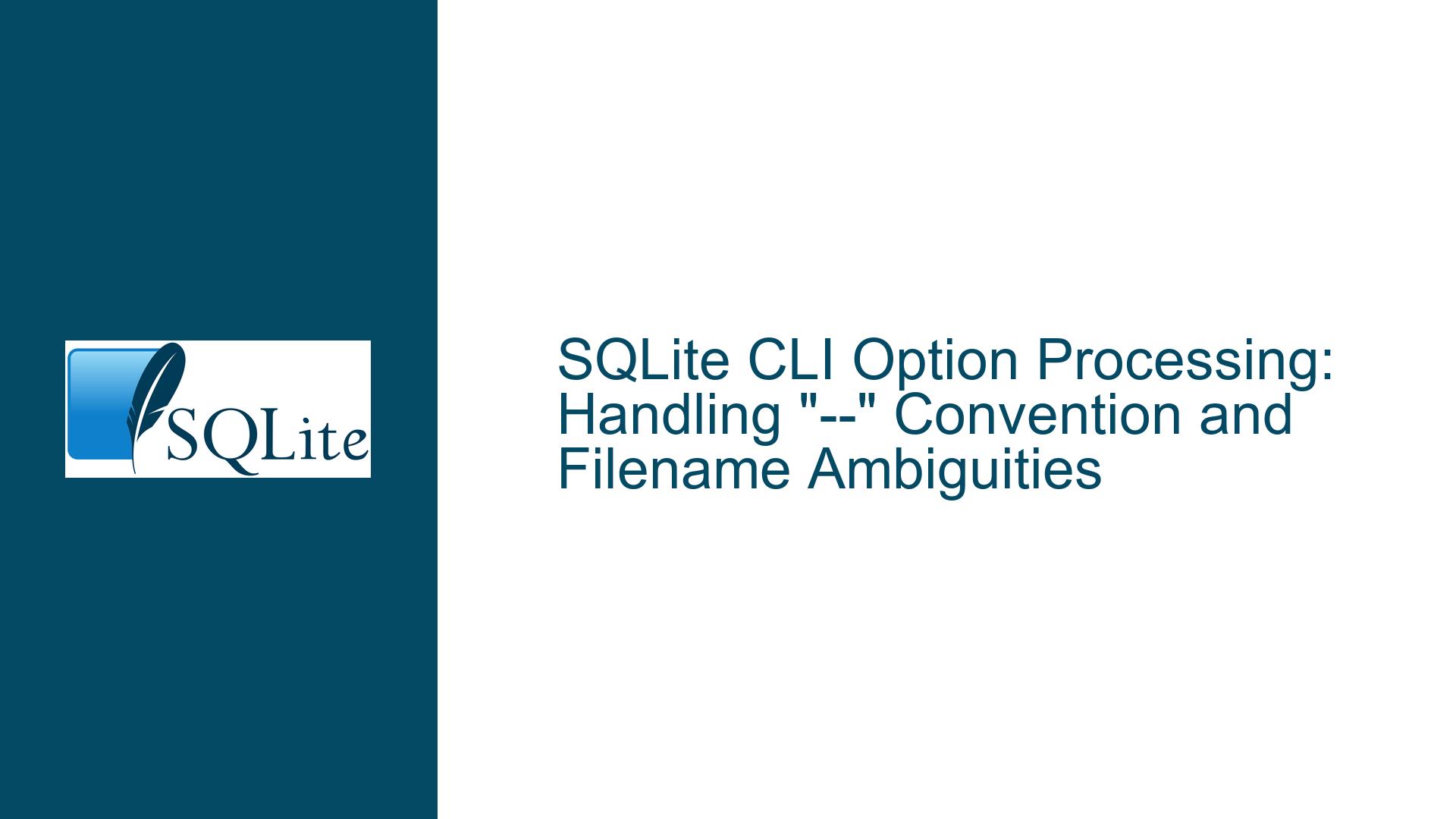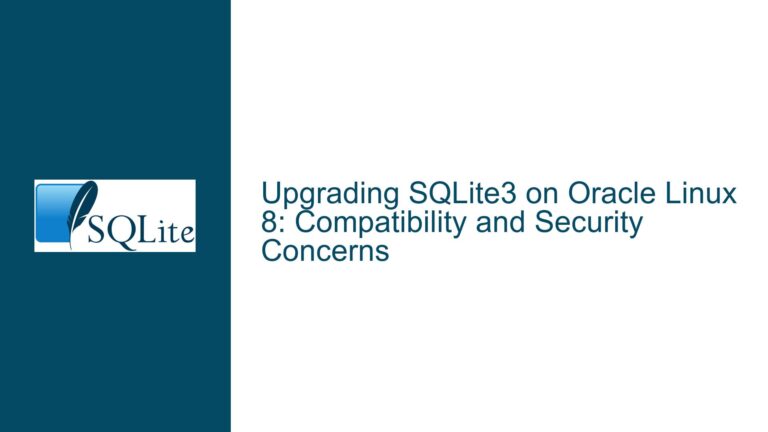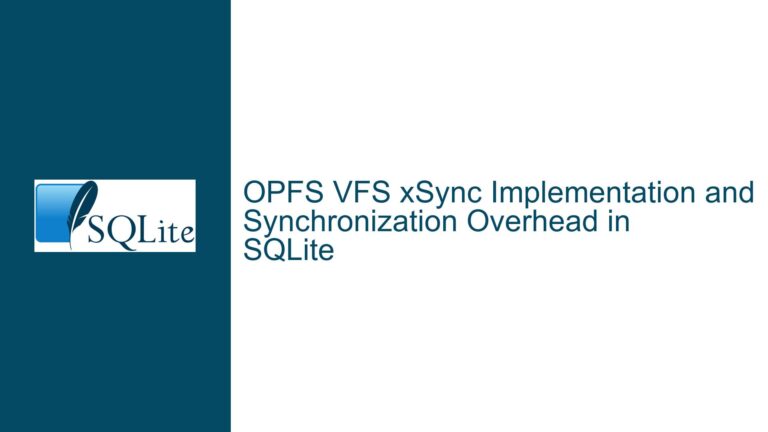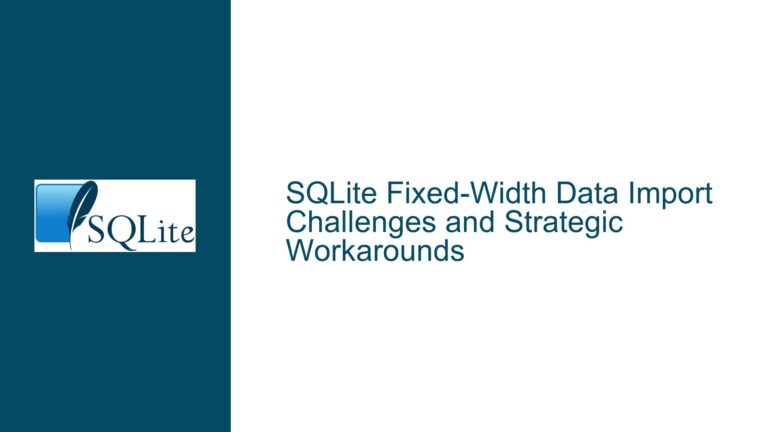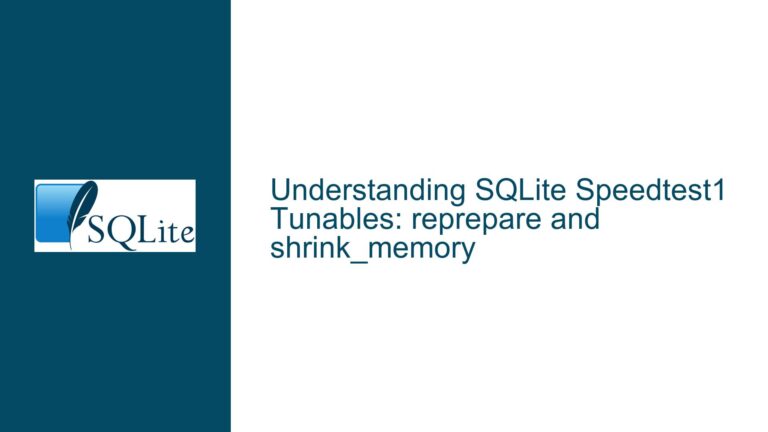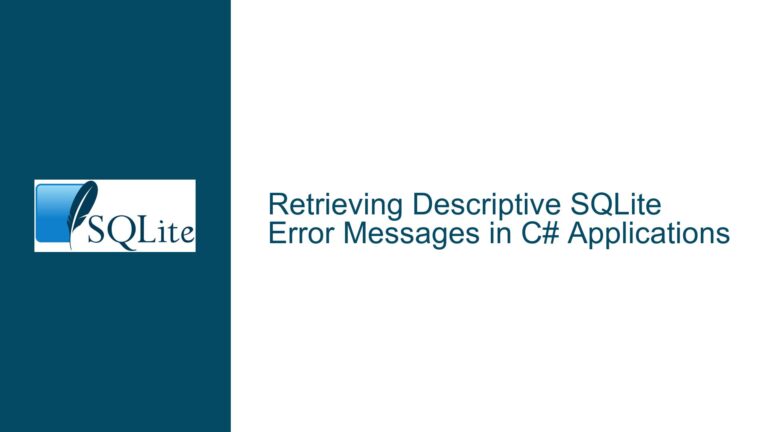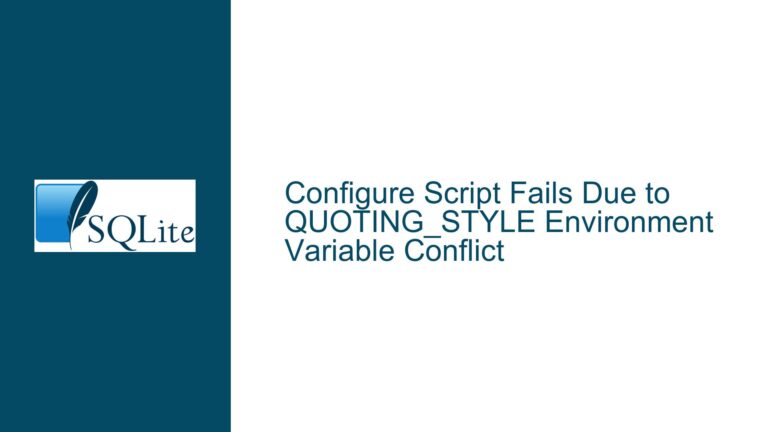SQLite CLI Option Processing: Handling “–” Convention and Filename Ambiguities
Issue Overview: SQLite CLI’s Non-Compliance with "–" Option Termination Convention
The SQLite command-line interface (CLI) currently does not adhere to the widely established convention of terminating option processing when it encounters a double hyphen (--). This convention, as outlined in POSIX.1-2017 section 12.2 guideline 10, dictates that the first -- argument not being an option-argument should serve as a delimiter indicating the end of options. Any subsequent arguments, even if they begin with a hyphen (-), should be treated as operands (e.g., filenames or SQL commands). This behavior is prevalent in many command-line utilities and is considered a defensive coding practice to prevent misinterpretation of arguments.
The absence of this feature in SQLite’s CLI can lead to ambiguities and errors, particularly when filenames or SQL commands begin with a hyphen. For example, if a user attempts to open a database file named -help, the CLI interprets -help as an option rather than a filename, resulting in an error: sqlite3: Error: unknown option: -help. This behavior complicates scripting scenarios where filenames are dynamically provided by users or external systems, as the script must account for and sanitize filenames to avoid such misinterpretations.
The core issue revolves around the CLI’s argument processing logic, which does not distinguish between options and operands after encountering --. This limitation forces users to employ workarounds, such as prefixing filenames with ./ (e.g., ./-help), to ensure they are interpreted correctly. While this workaround is effective, it places an unnecessary burden on users and script authors, particularly in environments where filenames are not under their direct control.
Possible Causes: Why SQLite CLI Lacks "–" Option Termination
The absence of the -- option termination convention in SQLite’s CLI can be attributed to several factors, ranging from historical design decisions to practical considerations. Understanding these causes is essential for evaluating the feasibility and impact of implementing this feature.
Historical Compatibility and Design Philosophy: SQLite’s CLI has historically prioritized simplicity and backward compatibility. Introducing new features, especially those that alter argument processing, risks breaking existing scripts and workflows. The developers have been cautious about changes that could introduce incompatibilities, even if the impact is minimal. For example, a file named
--would require special handling if the--convention were implemented, as it would no longer be interpretable as a filename without additional syntax (e.g.,sqlite3 -- --).Perceived Lack of Concrete Benefits: The primary argument against implementing the
--convention is the perceived lack of concrete benefits. While the convention is widely used, its absence in SQLite’s CLI has not been a significant pain point for most users. The workaround of prefixing filenames with./is straightforward and effective, reducing the urgency of addressing this issue. Additionally, filenames beginning with hyphens are relatively rare, further diminishing the perceived need for this feature.Complexity of Argument Processing Logic: SQLite’s CLI already has a complex argument processing scheme, which includes handling options like
-cmd,-batch, and-help, as well as interpreting filenames and SQL commands. Adding support for--would introduce additional complexity to this logic, potentially making the code harder to maintain and document. The developers have expressed concerns about further complicating the CLI’s behavior, especially if the benefits are marginal.Cross-Platform Considerations: SQLite is designed to run on a wide range of operating systems, including those that are not POSIX-compliant. While the
--convention is a POSIX guideline, its applicability to non-POSIX systems is less clear. The developers may have hesitated to implement a feature that is not universally relevant or enforceable across all platforms.Scripting Challenges and Edge Cases: Scripts that invoke SQLite’s CLI must account for various edge cases, such as filenames that resemble options or the presence of
.sqlitercfiles. While the--convention would mitigate some of these issues, it would not address all potential challenges. For example, scripts would still need to handle corrupt databases or invalid filenames, reducing the overall impact of this feature.
Troubleshooting Steps, Solutions & Fixes: Addressing "–" Option Termination in SQLite CLI
To address the issue of -- option termination in SQLite’s CLI, several approaches can be considered, ranging from implementing the convention to improving workarounds and documentation. Each solution has its trade-offs, and the optimal choice depends on the specific use case and priorities.
Implementing the "–" Convention: The most direct solution is to modify SQLite’s CLI to recognize
--as a delimiter for option processing. This change would align the CLI with POSIX guidelines and common practices in other command-line utilities. The implementation would involve updating the argument parsing logic to stop interpreting arguments as options after encountering--. For example, the commandsqlite3 -- -helpwould treat-helpas a filename rather than an option.- Benefits: This approach eliminates ambiguities and errors caused by filenames that begin with hyphens. It simplifies scripting by ensuring that filenames and SQL commands are always interpreted correctly, regardless of their content. The change would also enhance the CLI’s usability and consistency with other tools.
- Drawbacks: Implementing this feature requires careful consideration of backward compatibility and edge cases. For instance, a file named
--would need to be handled differently, as it would conflict with the new delimiter. Additionally, the change would introduce complexity to the argument processing logic, potentially making the code harder to maintain.
Improving Workarounds and Documentation: If implementing the
--convention is deemed too disruptive, an alternative approach is to improve the documentation and promote existing workarounds. For example, users can be encouraged to prefix filenames with./to avoid misinterpretation. This approach does not require any changes to the CLI’s codebase and can be implemented immediately.- Benefits: This solution is simple and does not risk introducing new bugs or incompatibilities. It leverages existing functionality and provides a clear, actionable guideline for users. The workaround is also portable across all platforms, making it a universal solution.
- Drawbacks: Relying on workarounds places the burden on users and script authors, who must remember to sanitize filenames. This approach does not address the root cause of the issue and may lead to frustration or errors in complex scripting scenarios.
Adding a New Option for Explicit Delimitation: Another potential solution is to introduce a new option, such as
--no-more-options, that explicitly disables further option processing. This approach provides a middle ground between full support for--and the status quo. Users can opt into the new behavior without affecting existing scripts.- Benefits: This solution offers flexibility and avoids breaking changes. It allows users to benefit from explicit delimitation without imposing new requirements on all scripts. The new option can be documented as a best practice for scripting scenarios.
- Drawbacks: Adding a new option increases the complexity of the CLI’s interface and documentation. Users must be aware of the new option and remember to use it when necessary. This approach also does not fully align with the POSIX guideline, as it requires an explicit opt-in.
Enhancing Script Robustness: Regardless of whether the
--convention is implemented, script authors can take steps to improve the robustness of their scripts. For example, scripts can validate filenames to ensure they do not begin with hyphens or other problematic characters. Additionally, scripts can use environment variables or configuration files to pass arguments securely.- Benefits: This approach empowers script authors to address potential issues proactively. It reduces reliance on the CLI’s behavior and ensures that scripts work reliably across different environments. Enhancing script robustness is a complementary measure that can be combined with other solutions.
- Drawbacks: This solution requires additional effort from script authors and may not be feasible in all scenarios. It also does not address the core issue of the CLI’s argument processing behavior.
Community Feedback and Iterative Improvement: Finally, the SQLite development team can solicit feedback from the community to gauge the demand for this feature and identify potential use cases. This approach ensures that any changes align with user needs and priorities. Iterative improvements can be made based on real-world feedback, reducing the risk of unintended consequences.
- Benefits: Engaging the community fosters collaboration and ensures that changes are well-received. Iterative improvements allow for gradual refinement of the feature, minimizing disruption and maximizing usability.
- Drawbacks: This approach requires time and effort to gather and analyze feedback. It may delay the implementation of the feature, especially if consensus is not reached quickly.
In conclusion, the issue of -- option termination in SQLite’s CLI highlights the tension between adhering to established conventions and maintaining simplicity and backward compatibility. While implementing the -- convention offers clear benefits, it also introduces challenges that must be carefully managed. Alternative solutions, such as improving workarounds or adding new options, provide viable paths forward without disrupting existing workflows. Ultimately, the best approach depends on the specific needs and priorities of the SQLite community and its users.
